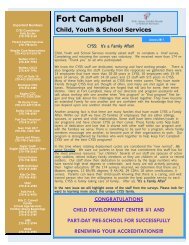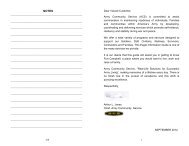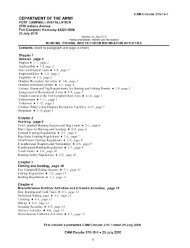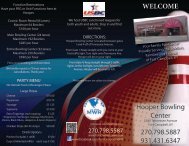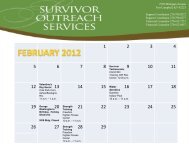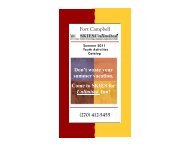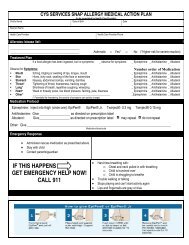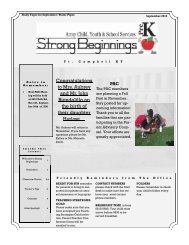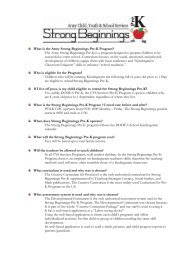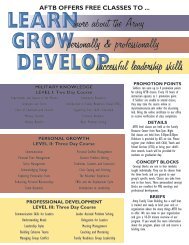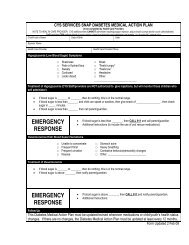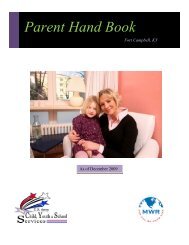AR 215?1 - Fort Campbell MWR
AR 215?1 - Fort Campbell MWR
AR 215?1 - Fort Campbell MWR
Create successful ePaper yourself
Turn your PDF publications into a flip-book with our unique Google optimized e-Paper software.
(2) Lessor will not be exempt from local property taxes, based on immunity as a NAFI/entity. Neither the NAFI/<br />
entity nor its patrons are subject to State or local use taxes as a consequence of subleasing to authorized users (see <strong>AR</strong><br />
<strong>215</strong>–4).<br />
(3) The lessor must retain liability insurance for injuries or loss occurring on or in leased property.<br />
m. Reimbursement of volunteer incidental expenses (10 USC 1588). Volunteers may be authorized reimbursement<br />
for certain incidental expenses in the course of providing voluntary services. Volunteer incidental expenses may be<br />
paid from available APFs or budgeted NAFs. The commander or official in charge of the sponsoring organization<br />
accepting the voluntary services will determine that reimbursement is necessary to obtain the voluntary services and<br />
that the amount to be reimbursed is reasonable in amount and in relation to the value of the voluntary services<br />
provided, following coordination with the responsible resource manager. Voluntary services may be provided to<br />
programs providing services to members of the armed forces and their Families, to include, but not limited, to Family<br />
programs and Family readiness, child, youth and school services, library and education, religious, housing referral,<br />
employment assistance to spouses of such members, and <strong>MWR</strong>. <strong>AR</strong> 608–1 provides more detailed guidance on<br />
determining whether to reimburse the volunteers with APFs or NAFs. It also provides guidance on when volunteers are<br />
considered employees of the Federal Government and the NAFI/entity. Chapter 13 of this regulation provides<br />
additional policy on volunteers. Funding may be provided on an equitable basis and in accordance with the following:<br />
(1) Reserve Component (RC) volunteers. To satisfy volunteer reimbursement requirements, the Director, Army<br />
National Guard (<strong>AR</strong>NG), and the Chief of Army Reserve may submit ALR SSE requests annually for the subsequent<br />
fiscal year (see chap 16) to F<strong>MWR</strong>C for review and approval. Regional Readiness Commands and State Adjutants<br />
General will be responsible for the accountability of reimbursement expenses in their geographic area.<br />
(2) Child care for volunteers. Available APFs will be authorized for child care expenses of volunteers. Budgeted<br />
NAFs may be used only when certified that APFs are not available. NAF expenses may be reimbursed by one of the<br />
following reimbursement methods, dependent upon the availability of child care:<br />
(a) Those using alternate child care or approved Family child care (FCC) (see definitions for both in <strong>AR</strong> 608–10)<br />
may be reimbursed from petty cash funds using accounting controls described in appendix G of this regulation and<br />
DFAS-IN Regulation 37-1, chapter 32 (para 320703). The reimbursement amount will not exceed the appropriate child<br />
development center (CDC) hourly rate or approved range of FCC fees for equivalent care.<br />
(b) Those using the CDC will sign for services rendered at the CDC on their agency specific sign-in sheet. The signin<br />
sheet will be attached to the daily activity report (D<strong>AR</strong>) and forwarded daily to the CAO for accounting as an<br />
interactivity expense transfer. Copies of sign-in sheets will be sent to the user agency monthly at a minimum for<br />
reconciliation. Programs using interactivity expense transfer will ensure that funds are available to cover child care<br />
expenses. To verify hours eligible for reimbursement, volunteers will be given a voucher to present to the CDC when<br />
their child is picked up. Child care over and above the time indicated on the voucher will be the responsibility of the<br />
volunteer.<br />
(c) Responsibility for resolving discrepancies between CDC sign-in sheets and actual hours contributed rests with<br />
the sponsoring organization. To prevent abuse, sponsoring organizations will review sign-in sheets and follow up on<br />
discrepancies.<br />
(3) Training. Funding will be authorized for volunteer training to include enrollment expense, travel, and per diem,<br />
held at another site, if it is determined that the supported organization would benefit from the offsite training.<br />
(4) Funding for travel. APF and NAF funding for travel will be in accordance with the JFTR and Secretary of the<br />
Army Travel Policy Army Directive 2005–01. Generally, when a volunteer spouse or other qualified individual is<br />
selected to serve as a member of the delegation to an official conference concerning Army Family programs or quality<br />
of life/well-being issues, the organization that is sponsoring the conference may authorize the sending command to<br />
issue invitational travel orders (per diem authorized) for that volunteer’s travel if certain conditions apply. Those<br />
conditions are detailed in Army Directive 2005–01.<br />
(5) Telephone bills. Reimbursement for long-distance telephone calls made as a result of volunteer duties will be<br />
authorized if documented and approved in advance.<br />
(6) Mileage and parking. Use of a POV to perform volunteer duties is a reimbursable expense. Current Government<br />
rates (see the Joint Travel Regulations (JTR)) will be used. Necessary parking fees incurred in the course of performing<br />
voluntary services is a reimbursable expense. A receipt is required to receive reimbursement.<br />
(7) Newsletters. Family readiness groups may use Government printing supplies and equipment and APF for postage<br />
for command authorized newsletters containing information that is otherwise unofficial, when the local commander<br />
determines that its dissemination may improve morale or esprit de corps. An unofficial item may be included only if it<br />
is not otherwise prohibited by DOD 4525.8–M, it does not exceed 20 percent of the printable space used for the<br />
official items, there are no increased costs to the Government, and it does not include personal wanted/for sale<br />
advertisements. (Newsletter content is official when it is educational, promotes unit cohesion, and is related to unit<br />
mission, Family readiness group programs, and Family and unit readiness.) (Unofficial information is nonmission<br />
related and more personal in nature, such as birth announcements, anniversaries, birthdays, recipes, fund raising for<br />
private organizations, and other similar events.) NAFs or funds generated by Family readiness groups may be used for<br />
<strong>AR</strong> <strong>215</strong>–1 31 July 2007/R<strong>AR</strong> 28 March 2010<br />
27



